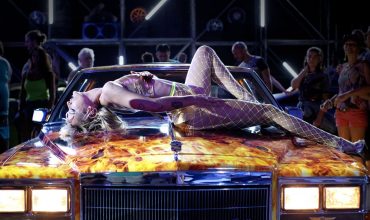Based on a short story by Joe Hill, Scott Derrickson’s The Black Phone is a well paced thriller that successfully crosses genre boundaries. Subverting expectations along the way is nice, but unfortunately the story telegraphs its main punches a mile off. This review contains spoilers, so if you wish to view The Black Phone impartially scroll straight to the last two paragraphs.
Denver, 1978; A masked serial killer the media has dubbed The Grabber (Ethan Hawk) has been busy snatching, imprisoning and killing middle school children in short order. Finney (Mason James) soon finds himself grabbed off the street and squirrelled away in a stark concrete basement, locked behind a heavy iron door. His only companion, a disconnected, old black rotary phone fixed to the wall.
Despite this dire circumstance, Finney has friends with an uncanny ability to tap into his somewhat light but serviceable psychic empathy. These friends, however, are dead. Previous victims of The Grabber’s dangerous games, they use the old phone to guide Finney through his ordeal.
Finney’s little sister Gwen (Madeleine McGraw) possesses a stronger psychic talent, plagued with dreams that prove to be accurate premonition. A talent their drunken, broken father Terrance (Jeremy Davies) brutally denies.
And we’re off, Finney is guided on the inside by the spirits of dead kids who are keen for vengeance while Gwen desperately searches her dreams for guidance to Finney’s prison. A scenario that sounds good on paper but robs itself of tension on screen. It’s difficult to feel isolated desperation when the outcome is a forgone conclusion from the get go, “You’re going to get out of here”. Finney’s journey in Grabber’s basement amounts to little more than an escape room walkthrough.
 An escape room with a masked tormentor who pokes his head in now and then, displaying one of about three and a half personalities each with matching expression (watch out for the grumpy one- it’s a trap), but for all his bluster The Grabber is a one dimensional antagonist full of style with little substance. While some breadcrumbs hinting at motivation for this boogie man are scattered here and there, Grabber suffers never being fully fleshed out on the screen. He just does what he does to creep everyone out and get to the next scene. There isn’t any how, what or why. We don’t need everything spelled out for the cheap seats, but Grabber needs more all round to become terrifying.
An escape room with a masked tormentor who pokes his head in now and then, displaying one of about three and a half personalities each with matching expression (watch out for the grumpy one- it’s a trap), but for all his bluster The Grabber is a one dimensional antagonist full of style with little substance. While some breadcrumbs hinting at motivation for this boogie man are scattered here and there, Grabber suffers never being fully fleshed out on the screen. He just does what he does to creep everyone out and get to the next scene. There isn’t any how, what or why. We don’t need everything spelled out for the cheap seats, but Grabber needs more all round to become terrifying.
Full tilt horror aficionados may be left disappointed with a lack of frequent tension and very few (but effective) jump scare moments. There is some impactful violence throughout. I had no idea late seventies Denver had such enthusiastic childhood street fighters and there is a scene of domestic abuse early on that’ll leave any parent heartbroken.
The Black Phone is a worthwhile rollercoaster none the less. Derrickson executes a wonderfully macabre atmosphere, and most performances are engaging. The musical score harks back to early pulse and synth, complimenting scenes effortlessly. Your mileage may vary based on your tolerance for comedic tonal shift, a superfluous character who should have been axed and a plotline robbed of its agency. The Black Phone runs for 103 minutes and pulls a 7/10 from a captive audience.


